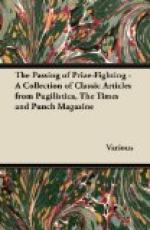Demand of the prosperous man of trade—of the man of funds, and houses, and land, acquired by successful projects—what is Life? He will try to call up a philosophic look, and passing his chin through his hand—(there is a brilliant on his little finger worth at least fifty guineas)—he will answer, “Life, sir—Life has its ups and downs; but taken altogether, for my part, I think a man a great sinner, a very great sinner, who doesn’t look upon life as a very pretty thing. But don’t let’s talk of such dry stuff—take off your glass—hang it!—no heel-taps.”
Ask another, whose whole soul, like a Ready Reckoner, is composed of figures,—what is Life? He, perhaps, will answer, “Why, sir, Life—if you insure at our office—is worth more than at any other establishment. We divide profits, and the rate of insurance decreases in proportion,” &c. &c.; and thus you will have Life valued, by the man who sees nothing in it but a privilege to get money, as the merest article of commercial stock.
Inquire of many an Alderman what is Life? He will tell you that it is a fine, dignified, full-bellied, purple-faced creature, in a furred and violet-coloured gown. “Life,” he will say, “always has its pleasures; but its day of great delight is the Ninth of November. Life, however, is especially agreeable in swan-hopping season, when white-bait abounds at Blackwall and Greenwich, and when the Lord Mayor gives his Easter-ball; and ‘keeps up the hospitalities of his high office.’” Not, however, that life is without its graver duties—its religious observations. Oh, no! it is the duty of well-to-do Life to punish starving men for forgetting its surpassing loveliness—it is a high obligation of Life to go to church in a carriage, and confess itself a miserable sinner—it is the duty of Life to read its bible; and then the Alderman, to show that he is well versed in the volume, quotes a passage—“when the voice of the turtle is heard in the land.”
Now ask the Paisley weaver what is Life? Bid the famine-stricken multitudes of Bolton to describe with their white lips the surpassing beauty of human existence. Can it be possible that the glorious presence—the beneficent genius that casts its blessings in the paths of other men—is such an ogre, a fiend, to the poor? Alas! is he not a daily tyrant, scourging with meanest wants—a creature that, with all its bounty to others, is to the poor and destitute more terrible than Death? Let Comfort paint a portrait of Life, and now Penury take the pencil. “Pooh! pooh!” cry the sage LAURIES of the world, looking at the two pictures—“that scoundrel Penury has drawn an infamous libel. That Life! with that withered face, sunken eye, and shrivelled lip; and what is worse, with a suicidal scar in its throat! That Life! The painter Penury is committed for a month as a rogue and vagabond. We shall look very narrowly into these cases.”
We agree with the profound Sir PETER LAURIE that it is a most wicked, a most foolish act of the poor man to end his misery by suicide. But we think there is a better remedy for such desperation than the tread-mill. The surest way for the rich and powerful of the world to make the poor man more careful of his life is to render it of greater value to him.




